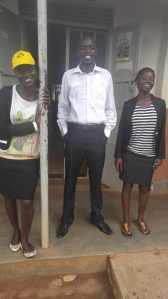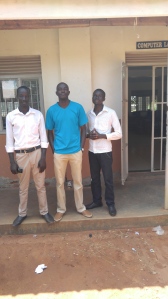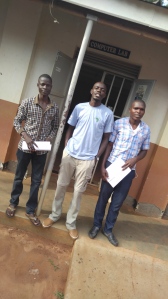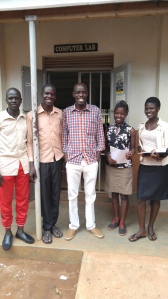My normal day begins when I wake up at around 5:30am, in time to catchup with the 6:00am BBC news on radio Mega FM. Thereafter, I listen to press review, to get a head start on the major issues in newspapers. Since 2000, I have been a fanatic of reading newspapers. Every week, I buy 3 or 4 times (Monday, Wednesday, Friday & Sunday).
I have my breakfast at 7:30am and thereafter live for office. When I arrive to school (by the way, teachers don’t have offices, they have open spaces to do work), I check on my teaching timetable to see if I have any lesson to conduct that day. I then check the in tray to see if I have uncompleted work from yesterday, or so. If I have, I go ahead and complete it. I then log into my email & social media accounts.
Ordinarily, apart from teaching, my work at school revolves around managing data/information and other computer issues.
However, at this time of the year, I receive numerous calls & Facebook messages from my former students, those who completed S.6 the previous year. They contact about two issues. For most of them, it is the about pursue higher education and others call or message to thank me for enabling them pass exams. The second reason is strange, because I think passing a collective effort of many teachers, parents and students themselves. I normally refuse to take credit alone.



Since 2014, I have been running a programme which I chose to call “Post High School Programme” (PHSP) at Lira Town College. The main objective of the PHSP is give career information and post-secondary education opportunities to students. I normally use 15 minutes of each of my 3 lessons in a week to talk about education after secondary school, opportunities for scholarships, different courses one can pursue, fees payable at universities and importance of living a responsible life.
This programme starts in School term II, and goes on until November, when S.6 candidates start their exams. So, in a week, I have 45 minutes of career talk.
Since I started in 2014, I realized that during this talks, students are very attentive, much attentive than when you are handling their academic topics.
They also tend to ask a lot of questions. However, due to limited time, I do not answer their questions and tell them to come to me privately.
My motivation for starting these programme is just one. When I started working at Lira Town College, I realized that most students had only two dreams – to enroll in UCC Aduku or Unyama NTC. I found these very strange. Every year, when government sponsored students list came out, Lira Town College was missing. Not even in the district quota lists admission lists. Why would some get 3 principal passes and go a Diploma programme? These are the kind of questions I sought answers for.
Robert Fritz once wrote that, “If you limit your choice to only what seems possible or reasonable, you disconnect yourself from what you truly want and all that is left is a compromise.” I think this was what our students were thinking. To them, University education was beyond them.
In much of Lango sub region, most people (read parents) think that University education is for the rich. I remember, my own parents told me that. If a parents can pay school fees of about UGX 400,000 per term for 4-6 years, I find it strange to give up after S.6. After all, there are only 2 semesters at university. A Computer Science degree that costs about 1,200,000 can be payable by such a parent.
Through the Post High School Programme, I wanted to give show that it is possible to pursue university education, even when you come from a poor family.
The other thing I did not anticipate is that the programme would be a huge success. For me, I thought I would just give information and then that is it. However, that was not the case.
When S.6 results come back in March, my office becomes very busy. Busy with former students.
After getting their results, they come back to ask me which course they can qualify for. They ask lots of questions, and with the help of the internet & my contacts at various universities, I can ably answer some of them from an informed point of view.
This brings me one begging question. After secondary school, who should help students? It is parents, former teachers or universities.
You see, I have always been a strong advocate of secondary-university partnerships. There is no reason why primary schools, secondary schools and universities work independently.
Primary schools feed secondary schools, who then provide students to the universities. In turn, the universities give them back to communities, when then scatter to do differently things in different sectors.
Information is power, so they say. It is a high time universities and secondary schools start working together. My programme alone, has provided Gulu University with many students, the numbers keep rising every year. The same with Kyambogo & Makerere. My students now have lots of valuable information, and with it they convince their parents that it is possible to pursue a course in Makerere, Kyambogo or Gulu. After studying all their lives in Lira, Oyam and or Apac, I very much encourage students to pursue high education in another region. Like myself and many others, having a multi-cultural experience is good. There is no need to for you to study in only one district. It limits your opportunities and dwarfs your outlook towards life.
When we were at Dr. Obote College, Boroboro (2008), one of the premier schools in Lira, we had some students who had been studying in only one parish. Canon Lawrence Demonstration Primary School (for primary), St. Katherine S.S (O-level) and then Dr. Obote College (A-level). This was laughable because all these schools are within 50 metres of each other. This only trains ultra conservative Ugandans who will never appreciate other tribes and cultures.
Universities have done little to connect to secondary schools. Lira Town College only receives only two universities every year. These are Gulu University and Uganda Christian University (UCU) who come for their yearly Outreach programme to try to sell their programmes to our students. Gulu University team, often from the Department of Computer Science, comes around in the October/November period, just before students start their final UACE exams. The UCU team comes in school term 1 (around February/March), and unlike the Gulu University team, they spend a whole two days talking to students. Other universities & institutions I think are comfortable with doing radio adverts and announcements. Yet there is more to be done.
When it comes to seeking higher education, I think all the important stakeholders to something. Parents provide the tuition, but lack vital up to date information about these things (how many of our parents have university degree or Masters?), students who certainly have a big problem selecting programmes to enroll for; and lastly the universities who provide the education.
It is a high time universities realize that it is difficult for students to access their information, and ultimately apply for different course they have becomes a tall order. Although in my programme, I encourage students to buy newspapers and check university websites, things in the villages are different.
It has even been complicated by the now common “online applications.” Kyambogo University came with it first in 2015, followed by Makerere and others have followed suit. Mbarara University of Science & Technology (MUST), KIU, UCU all now have online applications.
I have taken the initiative to support my students apply online, and also give them application forms for various universities & institutions. I now have students coming as far as Apac, Oyam, Kole and Alebtong. They were obvious referred to me by my former students. So, my small classroom programme is growing. In the period from April to June, I handle about 3-6 students every day, physically, on social media or phone calls. I do all these in my “small office”
One thing I am proud of is that, I know I am doing the right thing. The right thing to ensure that my students pursue higher education. I believe that “problems are only solved when one person decides to do something about it.”
The three things I am happy to have done in my career all have created massive impact. Starting the Science & Technology Innovation Club (STIC) which enabled us to gain national reputation in ICT competitions & several awards; the Post High School Programme (PHSP) which has enabled many students join universities & pursue their dreams; and lastly excellence in teaching ICT, which has turned us into some sort of ICT giants in the sub region(that’s what people tell me). From the onset, all these efforts came as a result of a well-intentioned decision to do more, to excel, to do the extraordinary to serve a people, community and by extension, the country. I borrow this quote, ”success is not just what you accomplish in your life, it is about what you inspire others to do.”
Back to my ordinary day. I receive request for data/information from my colleagues, teach my classes and do my online correspondence. These I do, up to around 1:00pm when I log out and shut down my laptop. I then check my diary to my “shopping” list (if there’s money). I then jump on my bicycle (most people don’t expect me to be riding a bicycle) and stop at the favourite supermarket (OM) and purchase and few items like sugar, coffee before proceeding home. At home, I listen to news or read a book, magazines or learn new software. I retire to bed after 10pm.
The Future:
My department will reach out to various universities & institutions to see how we can improve on the programme. My school has 250 students in S.6 every year. In Lango sub region, the number rises to about 1,600 students (Lango sub region has about 45 A-level schools). I can help 10, 50 or so. When the numbers grow, I will definitely need help. Help with internet, computers, stationery, airtime and others. That is why I am thinking. Thinking of scaling up these programme. My target next year is to handle 500 students. Despite our political problems as a country, I prefer to look into the future with a lot of hope. Hope for northern Uganda. Hope for a better generation.
Deep inside me, it is my deep conviction that teachers are best placed to deliver valuable life messages about relationships, appropriate behaviors and higher education. but just like other “struggles,” one needs to make a courageous decision of conscience & completely regard personal gain.
As of now, I continue to give a little help here and there. Asante Sana (Kiswahili). Apwoyo Matek (Lango). Eyalame noi noi (Ateso). Apwoyo sana sana (Kumam).



This is really good work you’re doing. Keep inspiring us 🙂
LikeLike
Good idea
LikeLike